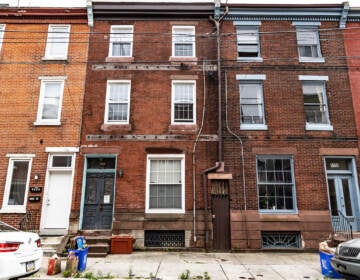Philly City Council poised to adopt proposal to create or preserve 30K housing units
Mayor Cherelle Parker wants City Council to approve her housing plan and the city’s next budget in tandem. Summer recess is scheduled to start June 12.

Philadelphia City Council President Kenyatta Johnson (Emma Lee/WHYY)
Have a question about Philly’s neighborhoods or the systems that shape them? PlanPhilly reporters want to hear from you! Ask us a question or send us a story idea you think we should cover.
Philadelphia City Council is on track to approve Mayor Cherelle Parker’s $2 billion housing proposal before the body breaks for the summer next month, keeping intact the administration’s timetable for passing the ambitious plan and the city’s next budget.
The proposal’s most critical legislative component was introduced Thursday. The measure outlines the plan’s programs and initiatives, and essentially authorizes the city to borrow $800 million in bonds — dollars the administration hopes to pair with additional public funding and $1 billion in city assets.
Those investments, paired with a package of related bills, are needed to implement the mayor’s Housing Opportunities Made Easy, or H.O.M.E., initiative, a multifaceted effort rooted in preserving and creating 30,000 housing units over four years amid an ongoing crisis.
While the city’s budget must be passed by June 30, the mayor’s deadline for the H.O.M.E. initiative is self-imposed.
The last regular council meeting is scheduled for June 12, though a special session may be added to the calendar to allow more time for negotiations and a final vote.
Following Thursday’s meeting, Council President Kenyatta Johnson told reporters he is optimistic about passing the budget and the mayor’s housing plan before the summer recess.
“All members of council are supportive of the H.O.M.E. plan, and so that’s a good start,” Johnson said. “And so it’s just working out details on what we all feel comfortable with in terms of supporting [the legislation].”
Lawmakers are expected to consider the budget and five bills tied to the H.O.M.E. initiative during committee hearings next week. The list includes zoning and parking measures, as well as the bond issuance.
The bond bill, the centerpiece of the proposal, also details a service agreement between the city and the Philadelphia Redevelopment Authority, which will be the bondholder. The arrangement enables the loan to be secured without voters first approving a ballot measure.
The measure also includes a provision that would give council oversight over the funding and how it is administered.
“Making sure members have input and making sure it’s collaborative in this process,” Johnson said.
If lawmakers adopt the mayor’s housing proposal, the redevelopment authority is expected to borrow about $400 million at a time, with the first tranche coming in the fall and the second about two years later. That split could change before a final vote, however.
Finance Director Rob Dubow has said the bond issuance would ultimately cost taxpayers about $1.3 billion when interest is taken into account. While rates will vary, he said there would be an average of $25 million a year in interest payments over 20 years.
Parker has transmitted two other H.O.M.E. bills to Council that have yet to be introduced. And it’s unclear if they will be before the summer recess.
Both would limit councilmanic prerogative, the longstanding and deeply-rooted practice that gives district council members immense control over how land gets used in the neighborhoods they represent.
One measure would generate a list of preapproved properties that could be disposed of without new legislation from a district councilmember. The other one is designed to streamline the Philadelphia Land Bank’s process for selling city-owned parcels.
“I am not trying in any way, shape or form to go to war with councilmanic prerogative. But with this H.O.M.E. initiative, I am proposing a new framework for how the disposition of municipally owned land could work as it relates to the home bond proceeds,” Parker said during a special session of council in March.
Although Council generally supports Parker’s housing proposal, lawmakers have raised concerns, including the timing of the bond issuance and the mayor’s timeline for implementing the plan.
During a spirited budget hearing earlier this month, Councilmember Nicolas O’Rourke told administration officials that such a comprehensive initiative would likely benefit from more time under the microscope. He suggested council members vote on the plan in the fall or winter, after a more “robust engagement process.”
“It feels like we’re kind of rushing this,” O’Rourke said.
The administration has insisted there is no time to wait given the great need for housing in the city, particularly for units affordable to residents with low-to-moderate incomes.
While defending the plan, officials have highlighted that Philadelphia is short an estimated 17,000 housing units, and that much of the city’s existing housing stock is decades old and in need of repair.
“We have a crisis and we want to address it now,” Tiffany Thurman, Parker’s chief of staff, recently told lawmakers. “We don’t want to be paralyzed by inaction.”

Subscribe to PlanPhilly
WHYY is your source for fact-based, in-depth journalism and information. As a nonprofit organization, we rely on financial support from readers like you. Please give today.









